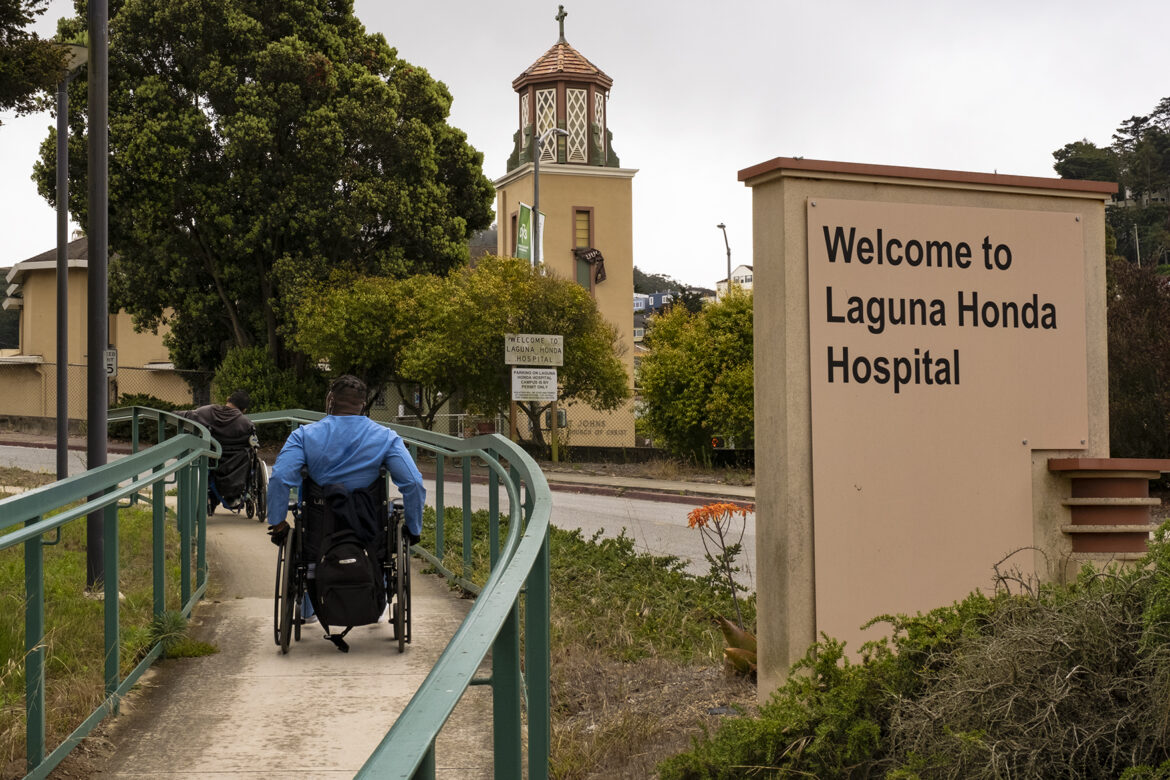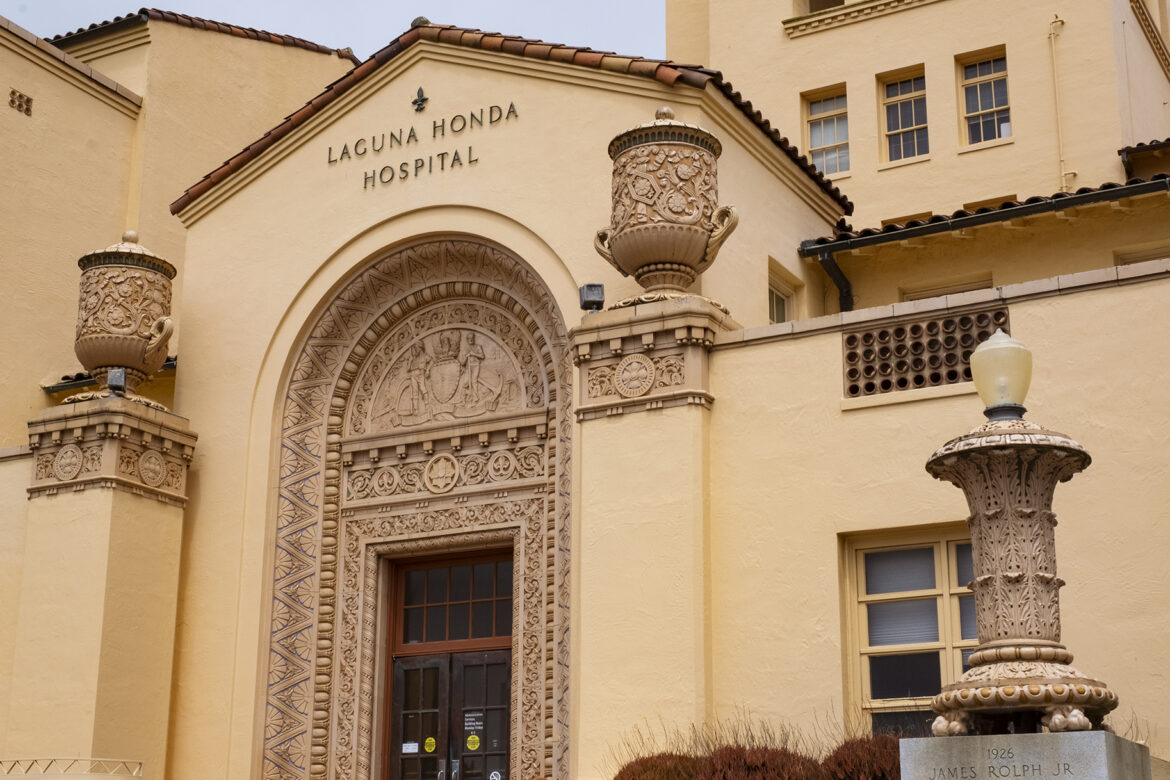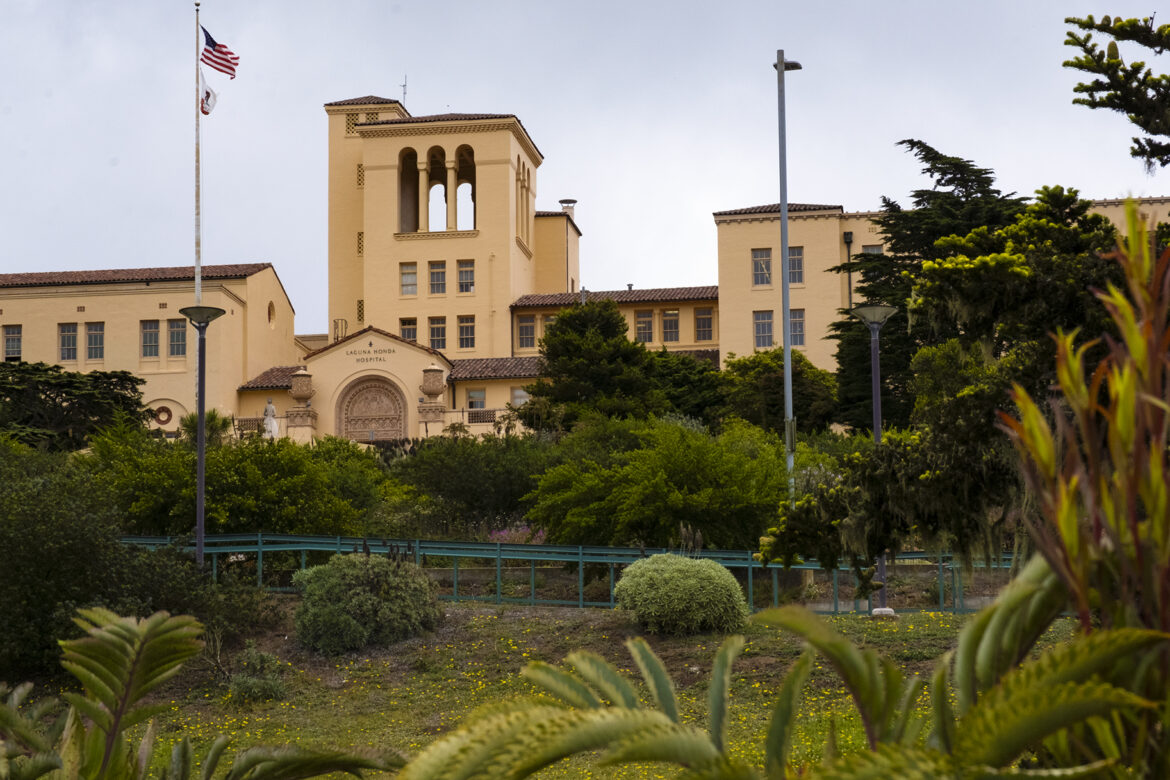This article is adapted from an episode of our podcast “Civic.” It is the first in a two-part series about the Centers for Medicare and Medicaid Services’ decision to pull funding for patient care at Laguna Honda Hospital.
Nearly 700 live-in patients at Laguna Honda Hospital were thrown into chaos this spring after a series of damning inspections led the Centers for Medicare and Medicaid Services to pull funding and mandate a closure plan for the facility.
It’s a dire situation for residents of the skilled nursing facility who have specialized needs that make them hard to place elsewhere. Hospital administrators are scrambling to attain the recertification needed to continue to receive federal funding.
Two former Laguna Honda physicians say they have continued to warn city officials about this looming crisis after first flagging it 18 years ago. That’s when a Department of Public Health policy began admitting to Laguna Honda patients whose needs fell outside the scope of a typical nursing home for the elderly.
“This shutdown was predictable,” former Laguna Honda physician Dr. Teresa Palmer said at a San Francisco Board of Supervisors hearing on June 14. “Normally, a nursing home is filled with primarily women over 85. And now you have a nursing home, with predominantly men from 40 to 60. The city needs to provide funding and a place for people with substance use problems and conduct disorders.”
The path to decertification began in July 2021 when two patients nonfatally overdosed on fentanyl and methamphetamine. That instigated an inspection by the California Public Health Department. In documents obtained by the Public Press, the Centers for Medicare and Medicaid Services reported that the inspection revealed 13 of 37 sampled patients tested positive for illicit drugs, and 23 of those patients had contraband items, including drugs, syringes and other drug paraphernalia.
Hospital officials were given until April 14 to resolve all its violations while regulators continued to conduct periodic inspections. Follow-up surveys exposed other serious breaches. Among them was an incident in which a patient smoked fentanyl during a psychiatric appointment. And hospital staffers admitted that they were unable to control illicit drug use among patients. Regulators declared a state of immediate jeopardy in March. In April, the hospital resolved problems with drugs and contraband, but inspectors discovered other problems around hygiene. That led the federal centers to decertify the hospital and announce that it would pull its funding for patient care. Regulators subsequently gave the hospital a four-month cushion with funding to Sept. 13.

Yesica Prado / San Francisco Public Press
After a smoke break, two patients roll their wheelchairs up a ramp toward the entrance of Laguna Honda Hospital in San Francisco’s Twin Peaks neighborhood.The San Francisco Department of Public Health owns and oversees Laguna Honda, and the city contributed $33 million to its $296 million budget last year. But according to its last annual report, about 99% of the hospital’s reimbursements for patient care came from Medicare and Medicaid — aka MediCal, which is covered by a combination of state and federal funds.
The city cannot cover the $15 million a month in federal money used to run the facility, but it is spending $5.6 million on two consultants with expertise in Centers for Medicare and Medicaid Services procedures to resolve the issues before applying for recertification and a commitment to continue funding past their September deadline.
Palmer, who was a geriatric physician at Laguna Honda from 1989 to 2004, said the current crisis could have been avoided if the city had heeded warnings issued 18 years ago when the Department of Public Health began intervening to change the hospital’s admissions policy.
In 2004, changes to the admissions policy were made in response to a city health department audit that found that some non-acute San Francisco General Hospital patients were in acute-care beds. Because they didn’t need acute care, Medicare didn’t cover their $1,300-per-day payments. The cost was being subsidized by the city at a rate of millions of dollars per year. The Department of Public Health corrected this mismanagement by transferring patients who didn’t require acute care to Laguna Honda. Among those patients were people with long term psychiatric needs, behavioral disorders, and substance abuse problems.
It was a practice called the “flow project,” according to Dr. Derek Kerr, who worked at the hospital for 10 years until he was fired in 2010 for blowing the whistle on an unrelated financial mismanagement case. He won a subsequent lawsuit for his improper dismissal and became an investigative reporter for the Westside Observer, a San Francisco news outlet. He takes a special interest in Laguna Honda. And full disclosure, he has also donated to the Public Press.
Kerr said that prior to the 2004 flow project, Laguna Honda had an admissions committee that would screen out patients “who are violent, who set fires, who were using drugs.” When the Department of Public Health took over those responsibilities, patients were admitted “regardless of behavioral issues,” he said. Staff was not equipped to care for patients with serious, long term psychiatric needs.
“So, that led to an upsurge in violence and drug use and intimidation,” Kerr said.
Ensuing complaints drew the attention of the state Occupational Safety and Health Administration and other regulatory agencies, he said, as well as protests by the medical staff, and a lawsuit was filed against the Department of Public Health. Then, in 2006, residents and former physicians proposed a ballot measure that would have prohibited admitting people with psychiatric or behavioral diagnoses, people who posed a threat to themselves or others, and people who needed short-term care. Opponents said the legislation was overly broad, and would have had unintended consequences, including discharging potentially hundreds of patients who badly needed treatment. Voters did not support the ballot measure. Nevertheless, new security and safety measures were adopted, and the flow project was officially reversed, but, Kerr said, patient admission practices didn’t change.

Yesica Prado / San Francisco Public Press
Laguna Honda opened in 1866 providing care for people who were indigent or chronically ill. Following the great earthquake and fire in 1906, it cared for thousands of displaced San Franciscans living in refugee camps scattered across the city. The transition from relief home to skilled nursing facility began in the 1920’s, according to a history of Laguna Honda on its website.The Department of Public Health declined an interview request but emailed an unsigned statement that “the hospital takes all findings from or [sic] regulators very seriously and we are making immediate improvements to address concerns.”
During the June 14 Board of Supervisors meeting, newly appointed Laguna Honda CEO Roland Pickens said officials plan to address problems related to changing patient population by separating patients into two towers according to their health care needs. He said this would “minimize regulatory noncompliance as it relates to substance use and behavioral disorders.”
During the hearing, Supervisor Myrna Melgar, who represents Laguna Honda’s district, pushed bank on the notion that a certain segment of the population should not be admitted to the hospital.
“The cure is not to serve a different population,” she said. “It is to come up with systems that deal with a population that we have today. That is who we are, that is our values of San Francisco, that’s who we need to be. And we need to do more of it actually, not less.”
San Francisco is working toward adding hundreds of mental health and addiction treatment beds throughout the city. In the 2022-2023 budget, Mayor London Breed allocated $57.5 million to operate newly acquired behavioral health facilities totaling 360 beds.
Next, we’ll examine the hospital’s efforts to fulfill a Centers for Medicare and Medicaid Services directive of moving all patients out of the facility before applying for recertification in the fall.










